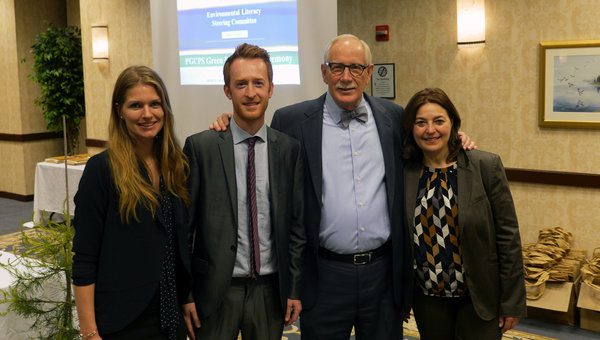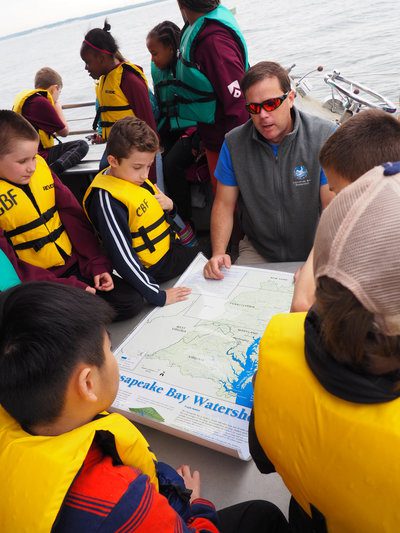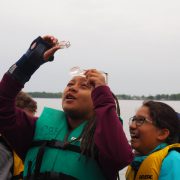Fostering the next generation of environmental stewards: Learning the Maryland way
Young people are the future. How they learn and develop their attitudes, characters and core beliefs will determine how they act and make decisions throughout their lives. The ability of young people to make informed decisions about their relationship to nature has profound implications for both the local and global environment and our collective wellbeing. Studies have shown that contact is key: if kids learn, play and interact with nature, they will value and cherish it. It was this realisation that led to some innovative and pioneering thinking with regards to education in the US state of Maryland; in 2011 it became the first jurisdiction anywhere in the world to make environmental literacy a high school graduation requirement. Last year we gave Maryland a Future Policy Award in recognition of this achievement.

WFC Delegation meets Dr. Kevin Maxwell, CEO of Prince George’s County public schools.
A WFC delegation has just returned from a ten day field trip across the state – from the Chesapeake Bay to the green mountains of the west – to witness environmental literacy in action. The trip included visiting schools and outdoor environmental education centres and talking to teachers, students, Congressmen and environmental education cheerleaders from Baltimore to Washington DC about their experiences since the law’s implementation.
The decision by the Governor of Maryland and the State Board of Education to introduce environmental education emerged from an ongoing concern for the Chesapeake Bay, a large estuary surrounded by Maryland and Virginia, which had become overfished and badly polluted with sewage, agricultural runoff and industrial waste since the 1970s. It was clear that a radical approach to educating young citizens on their relationship to the natural environment was needed. New Environmental Literacy Standards were introduced to build an environmental stewardship ethic in young people and reverse the environmental degradation in the bay. Each of Maryland’s 24 local education authorities (LEA) must now provide a holistic programme of environmental education taught from kindergarten to graduation, integrated across a wide range of subjects throughout the curriculum.
One of the early stops on the tour of Maryland was Crellen Elementary School in the green and mountainous terrain of western Maryland. The school has used their own transition from the polluted site of a former coal dump to a thriving wetland ecosystem to engage the kids in hands-on nature-based learning. Students as young as 8 led a tour across the school grounds, presenting the small farm where they learn to care for sheep and chickens as well as the restored wetland that is filtering pollutants from the site. Students frequently test the water quality of their own stream before releasing brown trout which they carefully raise in classroom tanks. In the school’s vegetable gardens, students are able to grow their lunch salads.
“We learned all about a new word the other day: biodiversity” one of students beamed while talking about the different macro-invertebrates that brown trout feed on. Despite having many students from disadvantaged backgrounds, the school is achieving some of the best test scores in the state.
 While Crellen is no doubt a great example of using nature as a learning tool to focus on real-world problems – combining a vibrant teaching environment with student led inquiry that is making learning both meaningful and fun – it is by no means atypical. In fact, Maryland’s environmental literacy standards not only encourage, but mandate, this kind of learning through the implementation of ‘local action projects that protect, sustain and enhance the natural environment’. At a bustling inner city high school in Baltimore we heard from Spanish and German teachers how they were integrating environmental literacy into their lessons; using recycled materials to make piñatas and taking environmental pollution as a theme to discuss in their class.
While Crellen is no doubt a great example of using nature as a learning tool to focus on real-world problems – combining a vibrant teaching environment with student led inquiry that is making learning both meaningful and fun – it is by no means atypical. In fact, Maryland’s environmental literacy standards not only encourage, but mandate, this kind of learning through the implementation of ‘local action projects that protect, sustain and enhance the natural environment’. At a bustling inner city high school in Baltimore we heard from Spanish and German teachers how they were integrating environmental literacy into their lessons; using recycled materials to make piñatas and taking environmental pollution as a theme to discuss in their class.
Getting kids outside the classroom is also now a priority and where possible teaching is done outdoors, in the form of natural history field trips, community service projects, experiential lessons in the school yard and participation in outdoor science classes. Each of Maryland’s local education authorities now has access to outdoor education centres which are used to enhance, extend and enrich the classroom curriculum.
At Arlington Echo, an outdoor education centre which hosts every 4th grade student in Anne Arundel County (over 25,000 children a year) for residential visits, enthusiastic kids net, identify and release fish and shrimp species and mulch trees while learning about the carbon cycle.
Of course one of the key factors of such a systemic change in the curriculum is support from across the education system and beyond. A broad coalition of actors from parents groups to federal agencies to local environmental NGOs worked together to introduce the changes and today continue to assist with implementation. Individuals such as Dr. Kevin Maxwell, Superintendent of Schools for Prince George’s County, passionately believe in Maryland’s new approach teaching kids they can make a positive difference in this world.
Impacts
Throughout the field trip our team saw evidence of sustained school-wide changes in knowledge, behaviour, and action as well as broad improvements in student’s learning outcomes and test scores across a wide range of subjects. One of the most impressive things was meeting so many children and young people who are clearly passionate about protecting the environment. From what we heard again and again from school kids across Maryland, they are learning the lesson of sustainability well. At the end of the day, when you’ve been having fun hatching brown trout, restocking oyster reefs and planting trees since Kindergarten is it any wonder many Maryland students grow to become caring stewards?
It’s now up to us all to ensure children across the planet have the same opportunities to experience engaging, holistic, nature-based learning.



